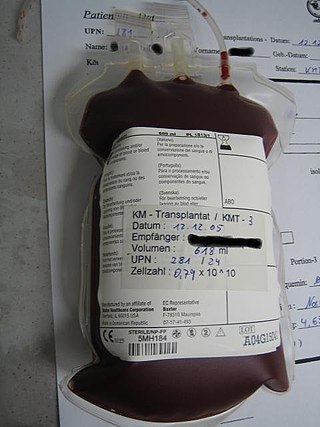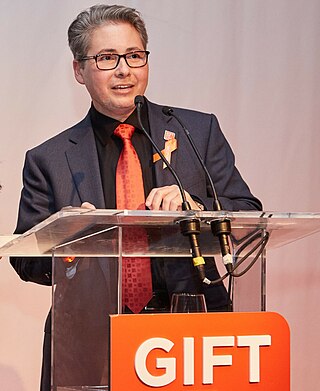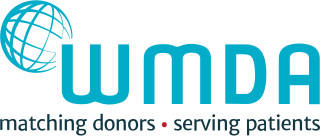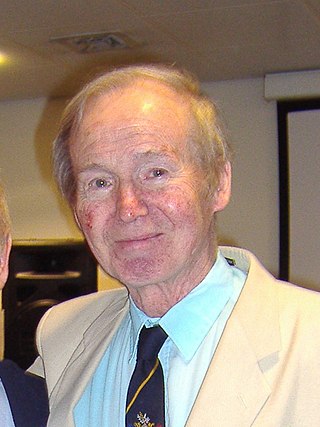Related Research Articles
Aplastic anemia (AA) is a severe hematologic condition in which the body fails to make blood cells in sufficient numbers. Blood cells are produced in the bone marrow by stem cells that reside there. Aplastic anemia causes a deficiency of all blood cell types: red blood cells, white blood cells, and platelets.

The human leukocyte antigen (HLA) system is a complex of genes on chromosome 6 in humans that encode cell-surface proteins responsible for regulation of the immune system. The HLA system is also known as the human version of the major histocompatibility complex (MHC) found in many animals.

Hematopoietic stem-cell transplantation (HSCT) is the transplantation of multipotent hematopoietic stem cells, usually derived from bone marrow, peripheral blood, or umbilical cord blood, in order to replicate inside a patient and produce additional normal blood cells. HSCT may be autologous, syngeneic, or allogeneic.

Graft-versus-host disease (GvHD) is a syndrome, characterized by inflammation in different organs. GvHD is commonly associated with bone marrow transplants and stem cell transplants.
A cord blood bank is a facility which stores umbilical cord blood for future use. Both private and public cord blood banks have developed in response to the potential for cord blood in treating diseases of the blood and immune systems. Public cord blood banks accept donations to be used for anyone in need, and as such function like public blood banks. Traditionally, public cord blood banking has been more widely accepted by the medical community. Private cord blood banks store cord blood solely for potential use by the donor or donor's family. Private banks typically charge around $2,000 for the collection and around $200 a year for storage.

Cell therapy is a therapy in which viable cells are injected, grafted or implanted into a patient in order to effectuate a medicinal effect, for example, by transplanting T-cells capable of fighting cancer cells via cell-mediated immunity in the course of immunotherapy, or grafting stem cells to regenerate diseased tissues.

Jay Feinberg is a long-term leukemia survivor, community organizer and founder and current CEO of the Gift of Life Marrow Registry.
The National Marrow Donor Program (NMDP) is a nonprofit organization founded in 1987 and based in Minneapolis, Minnesota, that operates the Be The Match Registry of volunteer hematopoietic cell donors and umbilical cord blood units in the United States.

World Marrow Donor Association (WMDA) is an organization based in Leiden, Netherlands, that coordinates the collection of the HLA phenotypes and other relevant data of volunteer hematopoietic cell donors and cord blood units across the globe.
Tissue typing is a procedure in which the tissues of a prospective donor and recipient are tested for compatibility prior to transplantation. Mismatched donor and recipient tissues can lead to rejection of the tissues. There are multiple methods of tissue typing.
Pablo Rubinstein is a pioneer in freezing of umbilical cord blood or placental blood cells for the use for unrelated donors to treat diseases like leukemia and genetic diseases such as Tay–Sachs disease and sickle cell anemia. He pioneered and established an international cord blood banking system and has played a leading role in international cord blood transplantation.

John Raymond Hobbs MRCS, FRCP, FRCPath, FRCPaed was a professor who was at the forefront of the techniques of clinical immunology, protein biochemistry and bone marrow transplantation, specifically in child health.

Paul Ichiro Terasaki was an American scientist in the field of human organ transplant technology, and professor emeritus of surgery at UCLA School of Medicine.
Transplantable organs and tissues may refer to both organs and tissues that are relatively often transplanted, as well as organs and tissues which are relatively seldom transplanted. In addition to this it may also refer to possible-transplants which are still in the experimental stage.

The Gift of Life Marrow Registry is a non-profit organization founded in 1991 and headquartered in Boca Raton, Florida that operates a public blood stem cell and bone marrow registry while facilitating transplants for children and adults battling life-threatening illnesses, including leukemia, lymphoma, other cancers and genetic diseases.
Guo Mei is a hematologist and associate director of 307th Hospital of Chinese People’s Liberation Army and deputy director of Radiation Research Institute.

Narinder Kumar Mehra is an Indian immunologist, head of the department of transplant immunology and immunogenetics of the SRL Limited, Gurgaon. He is a former dean of research and holds the ICMR Dr. C.G. Pandit National Chair at AIIMS. An elected fellow of the International Medical Sciences Academy, The World Academy of Sciences, Indian National Science Academy and National Academy of Sciences, India, Mehra is known for his research on histocompatibility and immunogenetics. The Council of Scientific and Industrial Research, the apex agency of the Government of India for scientific research, awarded him the Shanti Swarup Bhatnagar Prize for Science and Technology, one of the highest Indian science awards for his contributions to Medical Sciences in 1992. He received the Chevalier of the National Order of Merit from François Mitterrand in 2003.

DATRI is a not-for-profit organization registered in 2009 as a Section 8 company under Government of India. DATRI is one of the largest unrelated blood stem cell donors registry in India, that helps patients with blood cancer and other fatal blood disorders to find a HLA matched Blood Stem Cell donor. Blood stem cell transplant is a chance of cure for patients with blood cancer and other severe blood disorders. As of January 2023, DATRI has more than 5 lakhs voluntary donors registered and it has facilitated 1074 plus transplants worldwide. DATRI operates across India.

Shimon Slavin is an Israeli professor of medicine. He pioneered immunotherapy mediated by allogeneic donor lymphocytes and innovative methods for stem cell transplantation to cure hematological malignancies and solid tumors. He also used hematopoietic stem cells to induce transplantation tolerance to bone marrow and organ allografts.
References
- 1 2 3 4 5 "in Science Hall of Fame 2013 - Bios". Embassy of the United States, Cairo, Egypt. Archived from the original on 2015-09-17. Retrieved 2016-11-12.
- ↑ "Accreditation Committee". European Federation for Immunogenetics. Archived from the original on 10 May 2017. Retrieved 12 November 2016.
- 1 2 3 Elliman, Wendy. "Medicine: Equality Down to the Marrow". Hadassah Magazine. Retrieved 12 November 2016.
- 1 2 Siegel-Itzkovich, Judy (October 31, 2010). "Helping their own". The Jerusalem Post. Retrieved 12 November 2016.
- ↑ "Hadassah University Medical Center Hosts Bone Marrow Transplant Reunion". Hadassah International. 28 March 2012. Retrieved 12 November 2016.
- ↑ Sharing Life. Singapore: The World Marrow Donor Association (WMDA). 2016. ISBN 9789810969295 . Retrieved 12 November 2016.
- 1 2 3 Salih, Cale. "Bone Marrow Registry in Jerusalem Offers Hope to Arab Cancer Patients". Al-Monitor. Retrieved 12 November 2016.
- ↑ Leichman, Abigail Klein (February 15, 2011). "Welcome to the world's only Arab bone marrow registry – in Israel". Israel 21-C. Retrieved 12 November 2016.
- ↑ Eckstein, Marlene R. (January 13, 2011). "Israel Has First & Only Arab Bone Marrow Registry For Unrelated Arab Donors". The JAWA Report. Retrieved 12 November 2016.
- ↑ Peters, Mike. "Mission To Israel – Day Five – Nazareth". Love Hope Strength Foundation. 2013. Retrieved 12 November 2016.
- ↑ "Dr. Boshra Salem inducted into U.S. Department of State's Women in Science Hall of Fame". International Council for Science. Archived from the original on 19 August 2016. Retrieved 10 July 2016.
- ↑ "Hadassah's Dr. Amal Bishara Receives "Outstanding Woman Scientist Award" from US Department of State". Hadassah. Retrieved 12 November 2016.